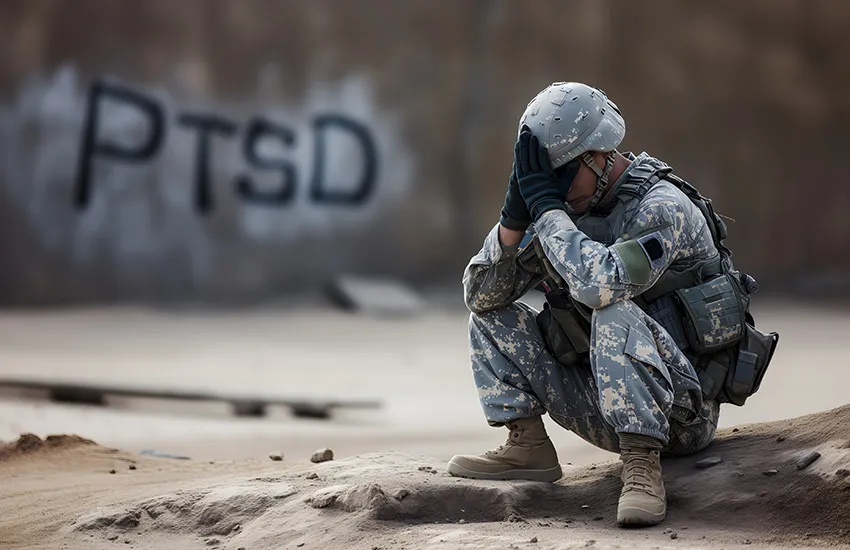Post-Traumatic Stress Disorder (PTSD) is a complex mental health condition that can develop after experiencing or witnessing a traumatic event. While it’s commonly associated with combat veterans, PTSD can affect anyone who has gone through a distressing or life-threatening event. Understanding the causes, signs, and impact of PTSD is crucial for recognising and addressing this often debilitating condition.
What is Post-Traumatic Stress Disorder?
Post-Traumatic Stress Disorder is a psychiatric disorder that can occur in people who have experienced or witnessed a traumatic event such as war, natural disasters, accidents, or assault. While it’s normal to experience stress reactions after trauma, PTSD is characterized by persistent symptoms that interfere with daily life and may last for months or years if left untreated.
PTSD can develop after experiencing a single traumatic event or prolonged exposure to trauma. Common triggers include:
- Combat exposure
- Physical or sexual assault
- Accidents or injuries
- Natural disasters
- Childhood abuse or neglect
- Witnessing violence or death

Signs and Symptoms
The symptoms of PTSD can vary in severity and may manifest differently from person to person. Common signs to look out for include:
- Intrusive memories or flashbacks of the traumatic event
- Nightmares or distressing dreams
- Avoidance of reminders or triggers associated with the trauma
- Hypervigilance or heightened arousal
- Negative changes in mood or cognition
- Difficulty concentrating or sleeping
- Irritability or outbursts of anger
- Feelings of detachment or numbness
What is the Impact of PTSD on an Individual’s Life?
Impact of Post-Traumatic Stress Disorder (PTSD) on individuals’ lives can be profound and far-reaching, affecting various aspects of their well-being and functioning. Here’s some of the more serious ways PTSD impacts the person life and behavious:
Relationships: PTSD can strain relationships with family, friends, and intimate partners. Individuals with PTSD may have difficulty expressing emotions, forming close bonds, or trusting others. They may also experience irritability, anger outbursts, or emotional detachment, which can lead to conflicts and breakdowns in communication. Intimacy and sexual relationships may also be affected, as individuals may struggle with physical and emotional closeness.
Work and School: PTSD can impair functioning at work or school, leading to decreased productivity, absenteeism, or difficulty concentrating. Individuals may find it challenging to maintain employment or academic performance due to symptoms such as intrusive memories, flashbacks, or hypervigilance. This can result in job loss, academic underachievement, or financial instability, further exacerbating stress and feelings of inadequacy.
Physical Health: PTSD is not only a psychological condition but also has physical health implications. Individuals with PTSD may experience chronic pain, headaches, gastrointestinal problems, or cardiovascular issues due to prolonged stress and arousal. Sleep disturbances, such as insomnia or nightmares, can also contribute to physical health problems and exacerbate existing medical conditions.
Mental Health: PTSD often co-occurs with other mental health disorders such as depression, anxiety, substance abuse, or self-destructive behaviors. Individuals may use alcohol, drugs, or risky behaviors as coping mechanisms to numb emotional pain or alleviate distressing symptoms. This can lead to a cycle of addiction, worsening mental health, and increased risk of suicidal thoughts or behaviors.
Quality of Life: Overall, PTSD can significantly diminish quality of life and hinder individuals’ ability to engage in daily activities, pursue goals, or experience joy and fulfillment. The constant intrusion of traumatic memories, avoidance of triggers, and hypervigilance can create a pervasive sense of fear, anxiety, or hopelessness. Social isolation, feelings of worthlessness, and a lack of purpose or meaning may further erode one’s sense of self-worth and satisfaction with life.
Long-Term Effects: Without proper treatment and support, PTSD can have long-term consequences, including chronic disability, impaired functioning, and reduced life expectancy. The cumulative impact of ongoing stress, mental health struggles, and physical health problems can take a toll on individuals’ overall well-being and resilience. However, with timely intervention and effective treatment, individuals can learn to manage symptoms, rebuild their lives, and cultivate resilience in the face of adversity.

Getting Help
Seeking help is essential for managing PTSD and improving quality of life. Treatment options may include:
Psychotherapy: Cognitive-behavioral therapy (CBT), exposure therapy, and eye movement desensitisation and reprocessing (EMDR) are effective in treating PTSD.
Medication: Antidepressants and anti-anxiety medications may help alleviate symptoms of PTSD.
Support groups: Connecting with others who have experienced similar trauma can provide validation, support, and coping strategies.
Lifestyle changes: Practicing self-care, engaging in regular exercise, and avoiding alcohol and drugs can help manage symptoms.
Professional help: If you or someone you know is struggling with PTSD, don’t hesitate to reach out to a mental health professional or crisis helpline for support and guidance.
Post-Traumatic Stress Disorder is a serious mental health condition that requires understanding, compassion, and appropriate treatment. By recognising the causes, signs, and impact of PTSD, individuals can take proactive steps to seek help, heal from trauma, and reclaim their lives. With the right support and resources, recovery from PTSD is possible, and individuals can move forward with hope and resilience.
If you or anyone you know is suffering from PTSD, please reach out. Our team at NAWA are leading experts for the treatment of PTSD.




